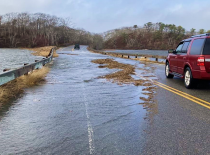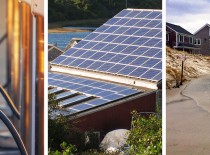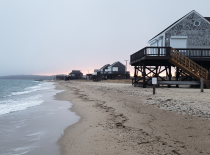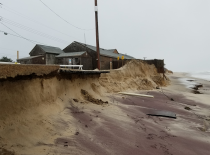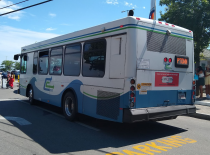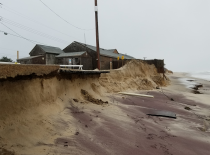Category: Climate
Cape Cod is increasingly vulnerable to the effects of sea level rise and storm surge and must prepare for the impact of more frequent and stronger storms. The Cape Cod Commission’s work includes tools and strategies to adapt to sea level rise and to increase the resilience of built, natural, and community systems.
Increasing t
The Cape Cod Commission has developed flood area design guidelines for Cape Cod that outline strategies for reducing or eliminating hazards from sea level rise and storm surge while protecting the region’s distinct character and historic resources
To guide the implementation of strategies and actions and to support municipal climate planning and action, the Commission has developed a Local Climate Action Toolkit. This toolkit provides information on specific actions municipalities can take to decrease local contributions to, and limit the effects of, climate change. The toolkit also provides important resources and context to support municipalities in prioritizing planning and implementation efforts.
The third cohort of the Cape Cod Climate Ambassador Program concluded on May 9, 2023, with students presenting climate projects to their peers. The Cape Cod Commission created the Climate Ambassador Program in 2021 to educate, engage, and empower young people on Cape Cod to work together to combat climate change.
As climate change continues to bring about more frequent and severe flooding, communities in flood-prone areas face increasing challenges adapting to these changes. On Cape Cod, where communities are particularly vulnerable, work to develop innovative solutions to mitigate the impacts of flooding is underway.
Explore a variety of electric vehicles on Saturday, June 3, 2023, at the Recharge Cape Cod Electric Vehicle (EV) Expo and Test Drive Event from 10 AM to 2 PM at the Hyannis Transportation Center.
Cape Cod Commission staff are working with all 15 Cape Cod communities to examine vulnerabilities in the roadway network and identify adaptation alternatives. The project employs state-of-the-art modeling and community engagement to identify and prioritize low-lying roads to target for coastal resiliency action. The towns of Barnstable, Bourne, Brewster, Eastham, Truro, and Wellfleet are at the stage of the project that includes review of conceptual designs for high-priority road segments.
Transportation accounts for 55% of greenhouse gas (GHG) emissions produced on Cape Cod. While riding public transit is a way to reduce GHG emissions from personal vehicles, a fleet of zero-emissions buses could further reduce emissions – which the Cape Cod Regional Transit Authority (CCRTA) hopes to accomplish. The Commission is working with the CCRTA on a nine-month study to explore transitioning to a zero-emission fleet.
The Cape Cod Commission will host a series of virtual public meetings in the coming weeks in the towns of Barnstable, Bourne, Brewster, Eastham, Truro, and Wellfleet to present conceptual design alternatives created by the Woods Hole Group to address vulnerable low-lying roadway segments, bridges, and culverts.
In 2022, the Cape Cod Commission worked with ten Cape Cod towns to examine vulnerabilities in the roadway network and identify adaptation improvements. The team has developed initial concepts for improvements and potential adaptation solutions for each prioritized site. Work in the remaining five Cape Cod towns of Chatham, Falmouth, Harwich, Mashpee, and Provincetown kicked off in early December.
